Articles published in September, 2024
[I forgot to mention that a few weeks ago I dinged my scooter (and myself) doing a silly thing on a hill in the village. We met a concrete wall, at very slow speed. It was enough to loosen the left mirror, scratch the screen, and hit a nerve somewhere in my left hip. I was persuaded, against my will, to get an X-ray. The nurse asked how it happened. Then she asked how old I was. I told her and she flew into a temper. What was I doing, at my age, riding a bike? I said, against the evidence, that it went very well – “Ca marche tres bien, merci.”
The X-ray produced nothing. The nerve pain has gone. I’m fine, but the mirror is still all over the place, because I couldn’t figure out how to fix it. On Thursday I was invited to lunch by three bikers – Paul, Paul and Pete.
Paula and Paul are two Brits who live on the other side of France. Peter Clark is my friendly neighbourhood Kiwi mechanic who said it will be easy to fix the mirror, next Thursday. So everything, as usual, has worked out fine. Just thought you’d like to know.]
Adrienne’s House, Kata Beach, 17th June 1976
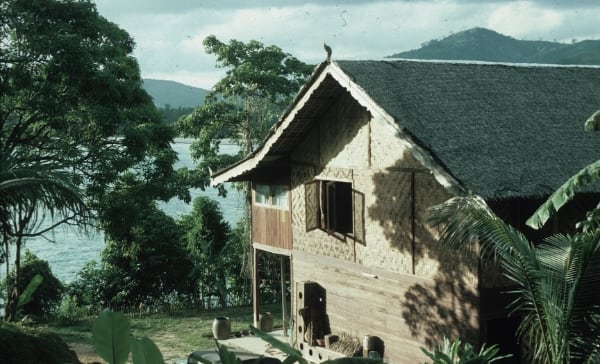
During my first two days I continued shaky and depressed, constipated, tired. On the third day I suddenly felt solid and ‘whole’ again. I know what it’s like to feel whole. Before this my separate parts were not working together, and I felt very vulnerable.
On Monday went to A’s shop at the resort. Saw a silver thimble with set stones that seemed good for Jo. Then became intoxicated by a set of bronze cutlery in a case with bronze handles.
Spent part of Tuesday wondering about it but felt that I would buy it. On Wednesday A & A left on a bus for Bangkok, with some trepidation when one of the regular buses was stopped by bandits and robbed. Paid for the cutlery. Saw them off. Alice gave directions for Nepal. Brought car back. The other two went out. I drank a bottle of beer and had a period of euphoria, considering my novel.
It also came to me that my proper position is to do and say only what I think is right and true, and if there is any part for me to play in the lives of others, then the call must come from them. Futile or destructive to plan participation.
Interesting, says Alice, how the way people travel reveals so much about them.
Here in Phuket an insect whistles in the heat continuously, like a kettle boiling in Ladbroke Gardens.
The English Hippy coming down the trail [in Nepal.] So pale, then he sees a bit of colour on his skin. “You’ve got hepatitis,” says his friend. “Really! I thought I was getting a tan at last.”
The world is kind to those who know how to be kind to themselves.
On my last afternoon walked up the hill behind the house and over the brow to look down on another smaller bay and green water breaking on the long gently inclining beach like lace ruffles on a silk shirt. Passed a small hut at the top where some young boys and a dog were busy. On the way back the eldest boy called “You.” (A very short oo sound) and the smaller ones now clustered in the doorway chorused after him. He held a green mango and proffered it with both hands before him in a supplicating attitude, pushing it towards me in a series of short thrusts. I walked up to accept it (wondering what I could do with it) when one of the other boys call out “One Baht.” That stopped me and my smile must have changed to surprise. “No, no,” he called, with real consternation, apparently overwhelmed by what he had done. I took the mango. It was the first, and probably my last chance to accept an unsolicited gift. Tomorrow, I’m afraid, there will be no free mangoes in Thailand. The Thais have been renowned for centuries by their spontaneous small acts of giving.
Friday 18th June
From Kata. Rose at 7. Packed. Ate eggs and coffee. House has been a bit desolate since the A’s left. Sorry it’s over, but glad to leave. Lost way slightly into town. A soggy-looking sky promises – and delivers rain. Lose my rain jacket at the Esso station. Ride back 12 miles to get it – but gone. A car driver picked it up before the Esso man could get it. Then I saw the green car pass me later in opposite direction. Missed both the sights I’d planned to visit but may have seen the cave outside Phang Nga.
Many small groups of rubber trees along roadside with latex mats hanging on wooden rails outside houses. Huts, rather. Nothing much in Krabi. Go on to Trang.
Enthusiastic schoolboys send me to hotel. Go walking in town. Buy umbrella, 53 baht. Find eating house. Fried chicken noodles with fat shrimps– 15 baht. Beer, 20. Coffee,4. When bill comes, noodles reduced to 10, beer to 17, coffee to 2, cigs and matches,7. Amazing spontaneous deductions. What to make of it? Very cheered. Go to bed at 7pm. Much too early, but tired. Woke up in night to write this. Two people are honking – not snoring.
Saturday 19th June
Up at 7. Coffee. Dim sum with meat filling., some tasty little rolls of prawn & dough, and sweet fried dough. The day seems to start well. Then I notice an unusual slackness about the tank bag. [The bike was parked inside the hotel for security.]
Scarcely able to believe my suspicion, but it’s horribly true. The camera has gone. That awful hostile emptiness where something should be is echoed by the hollow in my stomach. From the first moment I know it’s gone for good. Why even mention it? Why not just wheel the bike out into the sun with a satisfied smile, and leave.
But I have to go through the performance. Gradually the smiling faces around me change to more suitable expressions as they come to believe that I’m serious in my pantomime. The manager comes. He calls his staff one by one and upbraids them for failing to notice the thief. He knows better than I that it’s just a ritual. Then finally he comes to me and expresses his distress in the most ritualistic and, to me, amazing gesture of all. Body bowed forward, face raised up to mine, hands together in prayer, a strange smile with the corners of the mouth drawn down, lips tight across the teeth, nodding, “Sorry, sorry.”
Twice he does it. I’m so impressed that later, trying to keep the picture clearer in my mind, I can almost justify the loss of the camera by the experience. If only I could. In my distress my arithmetic goes to pieces and I’m confused by the currency which is a low denomination anyway. I insist that the camera is worth 100,000 baht. Afterwards I wonder whether I left anyone pondering what kind of camera it was that was worth $5000.
But there’s no denying it. I have been finally stripped of all my heroic, swashbuckler’s aura and reduced to the common tourist that I am. All tourists have their cameras stolen in Thailand. Well, I haven’t met one yet who hasn’t. And I’ve thoroughly joined that sorry legion of trippers. First the jacket. Then the camera.
Riding on, my mind turns the matter over and over, looking for its significance. An unusual number of near misses – two dogs and a kid goat come within inches of my front wheel. A lorry drives me into a patch of wet, newly laid tar and stones – the bike feels unstable again on slow corners. I feel the need to muster up more strength and resolution than my low reserves can provide. Care, patience, good humour.
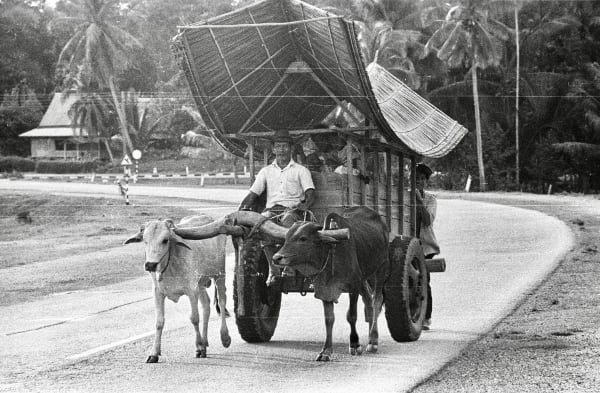
I’m passing blind through the countryside. No excitement, no interest. A pity. I thought I’d recovered it with my health. It must come back again. I still have the other camera. Only one to look after now. And the important lenses I still have. Will the ST stand as insurance? Who did I have that conversation with? Was it Mike Randall? And if the camera – what about the tape recorder? [I lost it in Ethiopia.]
Must remember the use of motorcycles in Thailand. Three or four people sandwiched on a small Honda is quite common. It’s rare to see one person alone. Here’s a complete family. Three adults, a baby on the back and another one stuck between them somewhere. And not going slowly. No helmets. And girls driving. Saw one girl fall off the back. She spun and tumbled in the air. Seemed to be all right though.
[Next week: Down ‘Smack Alley.’]
[Everything in these notebooks is, of course, personal, but some of what I wrote is so intimate and revealing that I was tempted to edit it out. I have resisted the temptation because the introspection that plays out inside the helmet on a solitary journey is a valuable part of the experience. My thoughts and judgements were necessarily fleeting and not what I might think today.]
From Haad Yai, Saturday June 12th
8.30 am Breakfast seems too expensive. Can’t get map. Ride out. Find myself trying to make comparisons between SE Asia and South America.
Somewhere there’s a conference to improve the world’s water supplies. Impossible. Would ruin the soft drinks industry.
And in Vancouver, Peter Shore at a housing conference criticises new building projects. Says emphasis should be on rehabilitation. Here they can’t tear the old buildings down fast enough. In Singapore one high-rise apartment every 15 minutes. Impossible to stop. What would the bright urban Chinese do without these projects to pay for their Mercedes, stereo and whisky?
Thai landscape looks cleaner than Malaya’s. My tinted goggles colour the rice paddies to look like a Singapore Airlines ad. Remember the hopelessly incongruous Western cigarette ads in Chinese coffee house – snatches of Henry Mancini orchestrations between Chinese messages on radio.
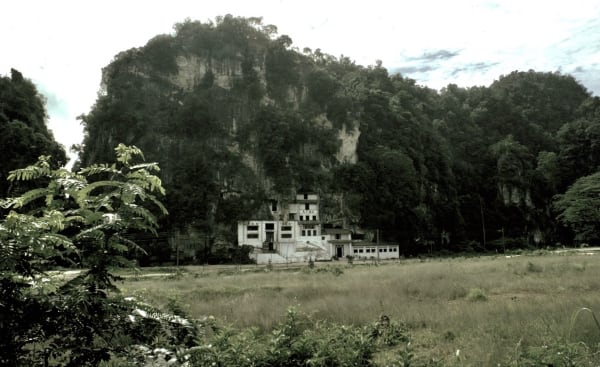
Pass through winding mountain passes. Soldiers around. Then to Trang. Stop for coffee and cakes. Previously ate a poor pineapple. The woman who sold it to me was so ashamed to take the money that she thrust another pineapple upon me. The last part of the journey was through gathering masses of those stumps of rock thrusting through the earth’s crust, with vertical walls eroded by falling water, trees and brush growing on every available ledge and from every cranny, and above all on the top so that they somehow seem crowned with green wigs. While others come to resemble each one a huge tree in a forest of giants. The road curls among these rocks in a series of ever tightening cavortings leading many drivers (in my mind’s eye at least) to a vortical doom.
I still find my handling a trifle unsteady when not under power. But nothing like what it had been earlier. Then I’d had a feeling of wobble so great that one, stopping at a junction, I was convinced my rear tyre had gone flat. The bike didn’t seem to want to go above 45 – increasing vibration and a sense of terrible strain. Later it occurred to me to check the alignment, not done when wheel was changed. The off-sides of both wheels were in line. I centered them and the effect was dramatic. There was much greater stability and the biked surged forward without protest.
I reflected on the damage that would be done to various parts by continual bad alignment, chain, both sprockets, tyres perhaps, even engine balance from the slightly outward component of tension.
As a result, arrived happily in Phuket before dark. I had carefully schooled myself against expectation knowing that particularly now my resilience was low. But I had not anticipated that I wouldn’t even be able to find Kata Beach. I had imagined an island with a ferry and so was surprised to find myself suddenly in Phuket, without even noticing the bridge. I rode the length of a drab-looking main street, hoping to spot a lucky sign with English subtitles. Nothing. Then I was at the end. A terminal roundabout. A couple of restaurants. Already I’d realised how little English is spoken.
Last night I’d battled to understand a young man in the restaurant. (He looked so much like the early Mike Molloy [an acquaintance from my newspaper days] – youth with dignity – eagerness with gravity) who wanted to tell me about something at 9 o’clock that I could go to. When it was 9, he came up and said “Now you can go. When he realised I wasn’t going it must have suddenly penetrated that I hadn’t understood a word. All my nods and grunts of encouragement hadn’t meant anything except Jimmy Carter’s self-centered desire “not to irritate.” He became all formality and distance.
In Phuket I found no-one who spoke even as well as he did. The word Kata itself, pronounced every way I could (correctly it sounds like “cutter”) left faces bright with incomprehension. Then at last somebody asked somebody and came to point me back into town with talk of “five ways” which seemed to be a roundabout. Then I found an expensive hotel with a Chinese receptionist. She did her best to dissuade me from going to Kata. “It’s a long way she said.” (It isn’t). Then she produced a map. “My hotel is here …“ For five baht.
At last I was on my way. Even so, the directions were wrong. But fortunately I asked again at the crucial crossing and got the right advice, to follow a dirt road over two brows and down to the beach hut, coffee shop.
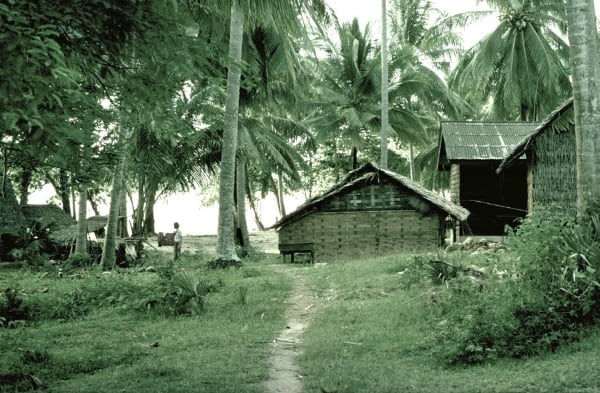
Kata beach, in 1976
A native came to greet me. I took him to be the proprietor when he offered me a drink. I took tea. Then he turned out to be the schoolmaster Hans had sent me to. And as we talked Adrienne came past in a Datsun. So, abandoning the bike went with her and companions (son Daniel, American Carol, Australian Alice) to another beach to eat fish and stuff. Now I had to admit the beaches were very welcoming – feeling I hadn’t known since San Andres. I was less certain about the girls – particularly the American who had a pseudo-fey act and strained after impossible similes – the sky she said, rather conclusively ¬– was like Beethoven’s Fifth Symphony.
Alice, argumentative and self-assertive, drew the same attitude from me (or was it vice-versa?) But at last it became clear that we could all co-exist, mainly because Adrienne seemed to glow with equal fondness at all of us.
Am much aware that I have to recover a great deal of moral strength to continue this journey. Physically I’m poor too. Constipation and putative piles make a poor combination, and my sequences all seem dislocated. There’s still a midget swinging his tiny torch around the edge of my right eye, and that ultimate fuzziness of vision is certainly depressing and disorientating.
Monday 14th
Reading “A Thinker’s Notebook. Posthumous papers of a Buddhist Monk.” And I suddenly realise:
I DON’T BELIEVE ANYONE
How long has this been true? For a very long time – it certainly goes back to my schooldays. When and where was I betrayed, and by whom?
And it comes to me now, as the immediate next thought, that the only person I know that I would be prepared to believe is Jo. [The girl friend I left behind in France.]
This not the same as believing in someone.
I believe in Carol, for example, but only in what she is – not in what she says or does.
This leads to a clearer perception of my love of ideals and systems, then my feeling for objects and wildlife and my eagerness for experiences. Always looking for the foundation for some credibility. And myself. How much I want to believe myself.
It is notable that no successful politician ever exhibits the qualities that thinking and feeling people associate with greatness. When the word genius is used in connection with elected politicians it is always understood to refer to a special and elementary scale of values suitable for mundane achievements.
I am accustomed to hear from people who stay in one place that there is no more to be learned from travelling around the world than by scratching in one’s own backyard. They seem to ignore that the proposition would be true either way around. A chacun son gout. (i.e. travelling seems to them a waste of effort.)
In fact the first requisite is to keep up the scratching. For a limited (though long) period of time I have found that travel stimulates me to scratch, while those who stay at home and talk about it generally have very smooth backyards.
There are of course other benefits of travel which cannot be had so easily at home, offering so much more of life’s furniture and ephemera, with which to clothe and refresh one’s ideas. And to travel alone is not unlike inhabiting a moveable monastery – attachments can be few. Often as I travel and feel my isolation I wonder whether I am moving towards a life free altogether from attachments or, on the contrary, am learning to value better those things and people to whom I wish to be attached once more. To me it is like the difference between meat and vegetables.
Wisdom is of the moment. It cannot last, but quickly decays and has to be renewed. So ‘wise people’ are always being caught out in acts of folly. While wisdom comes out of the mouths of babes. The wise “wise man” knows when to retreat into doubt and ignorance. Thus ‘no man is a hero to his valet’ and no man can be a guru to his wife. And heaven help him and his children if he tries to be a guru to them.
“The futility of life and the world” The man who insists that the violin in his hand is actually a hammer will soon find the violin futile.
PHUKET 13th – 18th June
Kata
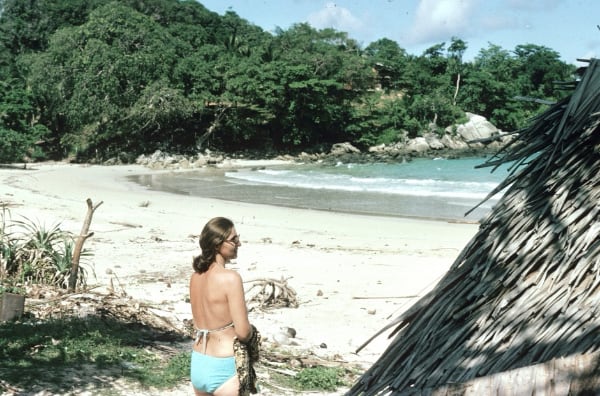
Adrienne and the beach
Half a mile of curling beach facing NW with small island at mouth of bay. Heavy vegetation on slopes, coconut palms on shore. Sea is green (shallow) and blue (deeper). Road enters at West end – two huts selling food and drink. Other huts at East end, and a generator. Fluorescent tube light and oil lamps. Water buffalo. Chickens. People moving slowly in sarongs. Fishermen along the beach at night, with torches among the rocks at the East end. Soon a prince is to build a hotel, and all will change. Now the schoolmaster rents out a bungalow, (e.g. to Hans.)
Alice: a blonde Gunilla in search of a title? Everything she says is extruded with great force, otherwise no-one will hear or believe – herself too, perhaps. Incredible, amazing, totally and completely. She and everyone else is always freaked out, spaces filled with “you know” often repeated. Good head, intelligent, greedy, ‘Jewish nose,’ square forceful jaw, neck round and pillar-like, set slightly forward on soft round shoulders. Too fat, but not obese. Australian originally, from Melbourne. ‘Ran away’ at 17, to Israel. Kibbutz, university at Jerusalem, BA in variety of subjects – major English. Now thirtyish. Worked in Hong Kong. Essalon where she met “amazing, incredible, high energy, powerful people.” [Llama Govinda, Feldenkreis, whose speciality is helping people recover disused faculties. Ruthie Allen, his disciple, etc.] Also Nepal, monasteries, courses, If any of this has planted a seed will the shoots ever emerge? Smokes heavily (so do I). Arrived at Phuket resort very debilitated. Met Adrienne and on the basis of mutual acquaintances, came to stay. Is much attached to the idea of “people chain.” One feels that without a mutual friend one has no credentials. Ours was Jane Raphael in Cape Town.
Dan: heavy, superficially benign, (21), but obsessed with his own problems – with some reason. Son by a previous marriage to an American in Louisiana but does not know his father. (Ceasarian birth perhaps – Adrienne has the scar but might be by other operation). Has few accomplishments but parlays them wildly in conversation. “Do you speak Thai?” – “YES, FLUENTLY!” Plays guitar – has never been able to keep a place in a band. – “I’ve played in a LOT of bands.” Likes buying machinery and taking it to pieces but, says Adrienne, someone else always has to put it together again. Came on very knowledgeable about Triumphs. He had one – knows the man with all the spare parts in Bangkok. Likes to talk about his problems – you can see him settling in to wallow in them – but cannot ask for help and finds it irrelevant when offered. He knows, you see. He wants to be a racing driver. Might kill himself at that, or some other way. Hope not. There’s a good man inside. His recent hernia operation is useful to him also. He used to lift cars with one hand. Paralysed.
Karen: Whatever is inside there she’s determined to hide it for forever. Make-up, blank eyes, frizzed hair, head band, clothes, gestures. She hangs tight and loses her balance constantly. Has learned to play and sing with a guitar – like a machine. She is a permanent disturbance, like generator – but produces no light.
Adrienne: Is French, from (somewhere) near Nancy. First to Louisiana where she met Paul, a Swiss who joined the US Air Force, flew planes, crashed one, and was grounded. Studied in the South on a GI Bill, later went into advertising in Thailand (Nestlé). Over ambitious, ulcers, eventually changed to hand-crafted jewellery exporting. Both embraced Buddhism. She pursues her knowledge and development on a daily basis, and has achieved much calm, enough to maintain tranquility for all these dissonant elements in her house. She likes to draw meaning and morals from life but can also stop talking. Often hums a few bars of something to displace the energy.
[In last week’s transcription from my notes, I left you while trying to raise my spirits by riding around the island of Penang. On one of the beaches I met a young German, recently graduated, who was trying to make his mind up whether to study medicine. For some reason he seemed to think my opinion was valuable but there was immediate sympathy between us. In return he recommended that I visit Kata beach, at Phuket, and seek out a woman called Adrienne.
Hans-Georg Hoffman did become a doctor, and he is my friend to this day.
In the meantime, while waiting for the new stator to arrive from England I thought I would take up fishing. I couldn’t find the beach that T’han had recommended, but I saw men fishing along the promenade in town and went to join them with my rod and tackle. What happened next is fully described in “Riding High,” but there is nothing in my notebook about it for the simple reason that I was blind and in hospital for a week, where my documents were stolen, demoralising me completely. When I came out to convalesce, I was in no state to make notes. Meanwhile the stator had arrived, and Lucas installed it for me. Eventually I felt able to ride again, but my plan to cross over to Indonesia for a short while had to be abandoned. I had already booked a passage to India, and there was only time to make a short trip into Thailand in search of Adrienne. Then I started again to make notes.]
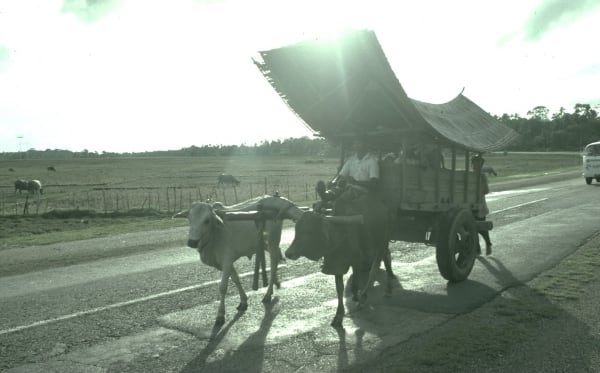
Friday, June 11th, Left for Haad Yai
Next to Kings Hotel, a smart hotel with a “drug store“ façade, is a dingy restaurant with box rooms upstairs. Sitting at a table, two Europeans. One tall thin, blonde, and very nervous with boiled blue eyes. A Norwegian. Next to him a squat bearded man with a square hard face. Swiss. The Norwegian speaks an efficient, mechanical English which he drives out of his mouth in lurches of fluency – like a tank turning a corner.
“You are quite right” – grind – “Thailand was full of Americans” – shudder – “the people were dependent on them” – His theory is that the Thais have become obstreperous and greedy because the Americans have abandoned them. An odd thesis. The Swiss listens impassively, obviously not impressed. Tired and shaken by this first journey since my last illness I accept what the place offers – an upstairs box with two hard beds, a fan, and two gauze covered escape hatches on to a narrow space between the two buildings through which float dank odours. 35 baht.
The two others want to make a round of the brothels in an open mini-bus – small Japanese type vehicle with a small bus body superimposed, two benches and a crew of two smiling, softly hustling me.
“You don’t worry for anything. I live here 25 years. You take number of car. You can tell police.”
We visit a series of lock-up shop fronts with the sliding mesh grills almost closed. Inside each one a room with hard seats and benches, a TV, shelves with little dolls on them . And girls with puffy made-up faces sitting around. Some quite pretty. Scenes of fearful boredom. We sit and stare at them a while. The Norwegian makes mechanical jokes. I read his copy of Newsweek. The US primaries are grinding on with their synthesized sensation. After three town brothels (at the third one a nice girl is fondling a toy chick) our guides offer us “the bungalow.” Best girls. Very expensive.
“If you find me a nice girl” says N, “and I don’t think it is very likely,” pause “I will stay with her for maybe one week. My girl has left me. I sent her money. I have given her 10,000 baht from Norway, but she is sick,” he coughs in illustration, “she has gone away. I offered to take her to a doctor. She has bronchitis and gonorrhea. For an injection. She won’t go. ‘Is too painful. Too pain-fool’ she says. I am heart broken. I must have a girl to forget.”
When he hears how I pay for my journey he becomes enthusiastic about journalism. He worked on a local paper. 7000 circulation. But not enough money. He became a radio operator. Worked on a ship for two years, between Malaysia and China. Never got off the ship. It was a hell of a life. I nearly got a breakdown.” Looks as though he might have one any minute.
The ”bungalow” is just outside town. Has two stories – a small suburban house. The prize girl, demure with clean features, a dazzling smile and a faint moustache, sits on show. She has just come back from school, we’re told. She has to earn money for books. N doesn’t fancy her but sees another and bargains for her. Finally for US$20 she comes back with us to spend the night with him.
Out walking in the evening and into King’s for a Thai dinner. There’s a police party filling the restaurant. The big shots make speeches – everybody keeps on talking among themselves – but applaud enthusiastically all the same. Three girls, specially dressed with strings of beads round their top knots, do Thai dances, swaying and figuring with their hands. Then singing. Then dancing. To my surprise the couples also face each other, swaying and moving their hands and arms in classical fashion. A living tradition, by God.
Terrible night in my box. Mosquitoes, damp air, At last get the net out and do my best with it. Some sleep. Narrative dreams.
Next week: In pursuit of Adrienne.
Hi everybody, I’m back.
Since the last instalment of my notes from the seventies I have been to a German biker meeting, in Gieboldehausen in the north of Germany. It’s quite a long way from where I live, so I made it a voyage of discovery, staying overnight in Brioude and Besançon on the way there, and in Strasbourg on the way back. I had never been to any of them before, and all three cities are wonderfully interesting, but the one that struck home was Besançon.
I hadn’t known it, but this city is famous for everything to do with time, and it was once the home of France’s biggest watch manufacturer, LIP. There were three floors of a museum dedicated to it. I don’t know if you remember, but when I got my bike out of the Triumph factory, the place was in turmoil. Now I learned that in 1973, at exactly the same time, the same month even, that the workers at the Triumph factory in Meriden where seizing the factory and locking out the management, the workers at LIP were doing the same thing. That I should stumble on this by accident just seemed remarkable to me. Here’s just one of the graphic posters they produced at the time.
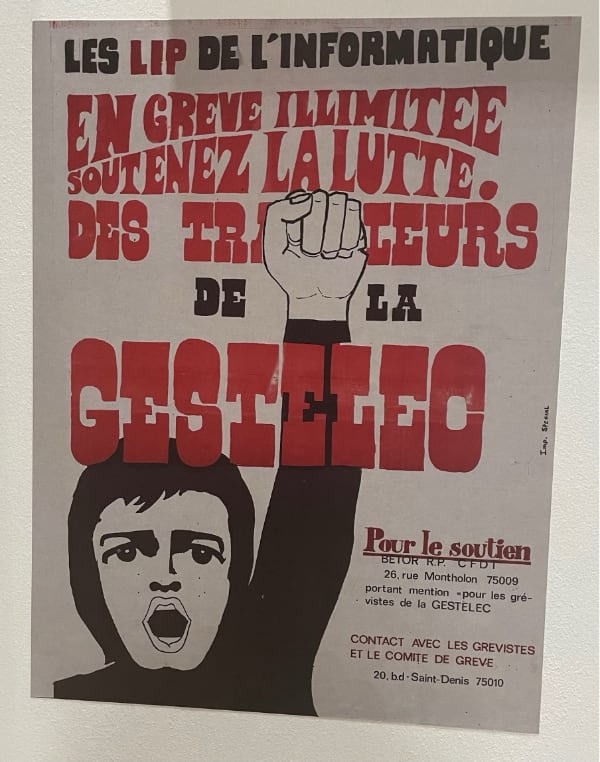
On permanent strike: support the fight of the workers
The fight went on for years but in the end, of course, both struggles were doomed.
I had a reason to go to Gieboldehausen.
My autobiography, “Don’t Boil the Canary,” has been translated into German and it has just been published. Translating a book as long as that one is a tremendous undertaking, and to have had it done by an established professional would have been much too costly. However, I have an angel. Her name is Eva Strehler, she wants to become professional, and she approached me more than a year ago to say she wanted to translate my book as an exercise, without payment. She did a couple of chapters and to my surprise they were good. So she ploughed on and gradually more people became involved in the project, reading the chapters, making suggestions. My cousin Christine, a quite literary doctor in the north of Germany, read them and discussed the problems of translating English vernacular into German with her friends. Ralph Wüstefeld of Gieboldehausen, who is one of the originators of the MotorRadTreffen, or MRT as it’s known also became involved and, being a businessman, he also arranged for it to be printed by Books On Demand. The title “Don’t Boil The Canary” does not translate well into German. It was my cousin who eventually came up with the title, ironically, in English: “Go For It.”
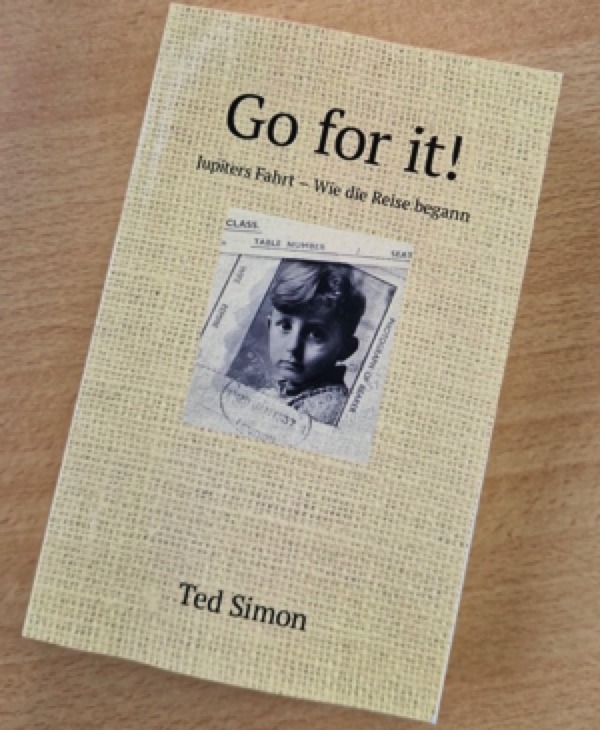
So finally the book was published, and I went to Gieboldehausen for the launch. More than 500 bikers who all have a taste for adventure received it very well and, more to the point, bought a lot of copies, so Eva will get something for all her hard work. She is quite a unique individual, well known for travelling with a sidecar and her dog, Polly. While all the excitement with my book was going on, she was away on her bike travelling through Iran. And then, disaster!. In a heavy traffic situation her dog got spooked and ran away, and is now lost forever. As if that wasn’t enough, when she finally gave up looking and left for Turkey, some miserable thief stole half her belongings. I know how one bad thing leads to another, which is pretty much the theme of these next episodes from the notebooks of my journey.
From My Notebooks in 1976: After Kuala Lumpur
[I remember, now, that Carol wanted me to take her to the Cameron Highlands, an area well known for its beauty and pleasant climate. It was shortly after our parting there, as I was riding down to go to the island of Penang, that I discovered that the stator, the very same spare part that I had just mailed back to England, was kaput. I was able to go on riding as long as the battery was charged, so I had to make frequent stops. At one such stop, where I stayed overnight, there was a three-day funeral in progress, involving tremendous noise all night. I described it in “Riding High.” Eventually I made it to the capital of Penang where Lucas had a branch, and they arranged to have a new stator flown out. I resigned myself to a three-week wait.]
Georgetown, May 8th
Shriven is the best word I can find to describe how I feel; stripped, shorn, reduced, after a series of incidents that have exhausted me.
There was a rough, socially paralysing and exorbitantly expensive passage from Perth to Singapore; followed in rapid succession by the harrowing conclusion of a crisis in my personal affairs, a 48-hour fever and a tropical cold that dragged on for a fortnight.
Singapore itself is an eardrum-shattering ordeal of torrential traffic and K.L. is no better. Between the two was rain. Just north of K.L. the motorcycle suddenly ceased to function, due to the failure of a part which could only be obtained from England.
I struggled on to Penang, determined at least to wait somewhere pleasant. For a few days, life picked up again. I got the front forks straightened out again – they’ve been crossed since Argentina – and . . . .
[Here my notes petered out. Then this on the next page.]
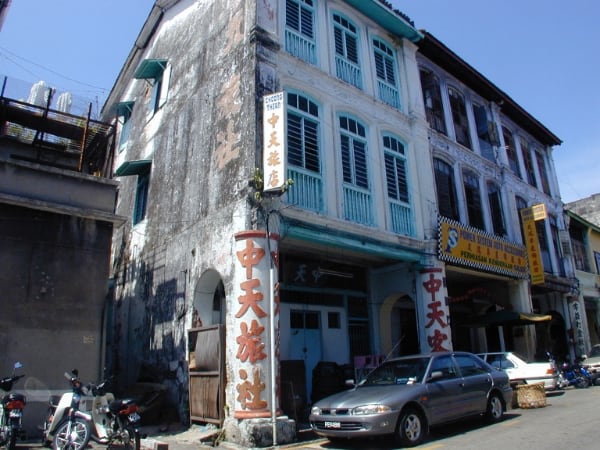
Choong Thean Hotel, 42 Rope Walk, Georgetown
Colours, pale blue and cream. Wooden shutters, painted floors and walls. Ten rooms on two floors, $5 for one, $6 for two. Ground floor open-fronted with folding shutters. Cement floor, motorcycles and bicycles. One round marble-topped table, a desk in corner outside the door of the boss’s room. Several Indian ladies of various ages and sizes sit around waiting for custom, sometimes outside on the pavement, sometimes inside. Most of them get five or six dollars a time, though there’s a thin younger one who gets more and is said to have a good technique. The hotel gets $1.20 for the use of the small room at the back between the mah jong tables and the kitchen. A belligerent bouncy fellow with eyes like marbles runs the tables and gets 40 cents a game. The tables have slots on each edge for counters and pads f white paper pinned on the top to make a fresh surface for each game. Many of the customers are fishermen passing time between bringing their catch to market and going out again at night.
In the room beneath mine the abacus clicks away a lot of the time and there are usually several men there during the day, but what they are computing I don’t yet know.
Th’an sits in the front from about lunchtime to 2 am – sometimes with his head sunk on hos breasts dozing, sometimes dreaming of his forthcoming journey around the world – when he gets his 50,000 dollars. He doesn’t think he can do it for less., and he will of course buy travelling cheques. He will spend several months in each country and is particularly set on visiting France.
At other times his mood is more morose and he dwells on his misfortunes – the sale of his stamp and coin collections during the years of 73 and 74 when he could not get any work and had no food to feed his stomach. Then he remembers the Australian man who was so good to him – “I do not know the reason why” – and Th’an cried when he flew away. Afterwards he wrote many times and got no reply and at last he found out that the man was dead.
Th’an says that he could have been a police inspector if he had been prepared to have an operation on his tongue “to cut the string” but he had been tongue-tied since birth and was afraid to go in. He can manage to speak quite well, even in English, and his vocabulary is better than most. Uses words like “seldom.”
Among my fragmentary thoughts about life in Penang – the first excitement fades very rapidly unless something more substantial comes to support one’s interest. At the temple crowds of people dashing in and out with bundles of flaming paper (money?) and chucking them perfunctorily into the incinerators, eyes bleary from the smoke. Everyone also carries bundles of smouldering incense sticks and shuffles them up and down rapidly. The quantities of combustibles bought and consumed in front of one’s eyes is impressive – but there’s a total absence of any sense of purpose or reverence and a good deal of it is obviously automatic rigmarole made worse by the obvious desire to show off by burning bigger bundles than anyone else’s. Everything goes up in smoke and the industry that provides these ephemera must be huge.
Alongside the hotel in Rope Walk are several concerns engaged in making artefacts for religious ceremonies. From elaborate houses of paper on split bamboo frames to shoes ($2 a pair) motorcycles, human figures, etc. All to be burned in offerings. Opposite is a family which, for five generations, has been performing the ceremonies – dressing up every night – chanting, hitting sticks, gongs, bells – leaping over fire, and erecting and taking down their stages all over town.
The boss is a tough-looking man with stubbly grey hair, too busy to stop. The young man who talked to me says they all feel very serious about it. The idea of spending one’s life constructing such elaborate artefacts only to see them going up in flames is a bit exhausting to my mind.
I had spent a week in Georgetown, mostly working on the bike and while it wasn’t unpleasant, I wasn’t at my best either. The first nights I was disturbed by the fan on the floor below drilling up through my pillow, and a rich orchestra of noises made by the others in the hotel who seemed to take it in turns to contribute their coughs and snores rather than getting it over with in a single crescendo. There was something extreme about their noises – where in Europe you might have a few dry coughs, here it sounds like the last explosive rending of the tissues. In the tropics everything is bigger, louder, wetter, dirtier, quicker.
The days were hot and humid, I was drinking too much bottled fizz and not functioning well. Emotionally I was numbed. Then on a Saturday, after a false start the day before, I got the bike on the road at lunchtime and went round the island. There had been heavy rain, the sky was clear and the air much drier. I got my rod and tackle from the hotel and set off to find Bahu Manang where Th’an had told me to fish. But I’d got a false notion of where it was and far from being a bit along from Batu Ferringhi it was almost back to Georgetown on the other side of the island. It became a fine ride over small mountains, and into the valley between to see a play being performed (mostly for children it seemed) on a stage in a village. Two men were on the stage most of the time. One seemed to be a mandarin figure and the other his very obsequious lackey. At one point they left the stage, and a woman appeared dressed in an amazing costume, a huntress, modelled after an early Victorian engraving. She shot a limp arrow in the air and a red cloth bird fell, thump, from the ceiling.









